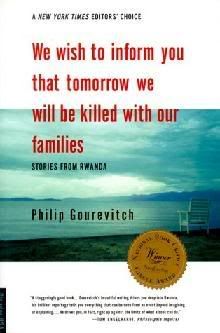|
Sunday, November 04, 2007
Rwanda 1994
Title: We wish to inform you that tomorrow we will be killed with our families: Stories from Rwanda
Author: Philip Gourevitch

I was reminded of a conversation I had with an American military intelligence office who was having a supper of Jack Daniel’s and Coca-Cola at a Kigali bar.
“I hear you’re interested in genocide,” the American said. “Do you know what genocide is?”
I asked him to tell me.
“A cheese sandwich,” he said. “Write it down. Genocide is a cheese sandwich.”
I asked him how he figured that.
“What does anyone care about a cheese sandwich?” he said. “Genocide, genocide, genocide. Cheese sandwich, cheese sandwich, cheese sandwich. Who gives a shit? Crimes against humanity. Where’s humanity? Who’s humanity? You? Me? Did you see a crime committed against you? Hey, just a million Rwandans. Did you ever hear about the Genocide Convention?”
I said I had.
“That convention,” the American at the bar said, “makes a nice wrapping for a cheese sandwich.”
We wish to inform you that tomorrow we will be killed with our families, by Philip Gourevitch, is an incredible account of the 1994 Rwanda genocide. That summer, Rwanda’s Hutu majority slaughtered a million of the minority Tutsis, literally decimating the nation’s population – that is, reducing it by one-tenth. The speed and efficiency of the killings were unprecedented, and thankfully remain unmatched to this day. Gourevitch tells the stories of the individuals who lived through this genocide – the villains, the heroes, and those who were simply lucky to survive. It’s an amazing piece of journalism, and one of the few books that I would confidently recommend as required reading for all.
(For those who are curious, the title of Gourevitch’s book comes from a letter written by Tutsis to a prominent Hutu leader in their village, Pastor Elizaphan Ntakirutimana. The Tutsi’s execution date has been announced, and the letter begs the pastor to intercede on their behalf. Before the genocide, they had been members of his church. Ntakirutimana’s response was disheartening: “Your problem has already found a solution. You must die.” They did.)
We wish to inform you leaves no aspect of Rwanda’s genocide unexplored. Gourevitch begins during the colonial era, when -- based upon superficial factors such as height and facial features -- Rwanda’s Belgium occupiers arbitrarily divided the population into the upper class Tutsis and working class Hutus. He then takes you through the genocide and into the refugee camps that housed the survivors. These camps were just as dangerous as the villages where the genocide had raged. Often enough, they were populated by genocidaires who were receiving food and water from international aid workers who didn’t question whether their charity cases were criminals or not. And Rwandans’ problems didn’t end when they were finally able to return home. How does one survive in the aftermath of such an event? Gourevitch asks. How does one continue with daily life, when your entire family was killed by your neighbor with a machete?
Gourevitch’s writing is impeccable. He conveys the horror of genocide in a manner that is intellectually and emotionally engaging, but which never sinks into the black mire of cheap sentiment. The Rwandans’ stories are not exploited for dramatic purposes, but are told in a sensible, affecting, and respectful manner. The ugliness of genocide speaks for itself. Gourevitch wisely realizes he need not screech from a soap box to command attention. I appreciated that.
Gourevitch also impressed me by directly addressing my discomfort with the subject of genocide. While macabre details do not perturb me, my motivation for reading such details does. I do not want to be someone who wallows in the real suffering of others. My reason for reading this book should not be the pursuit of some emotional catharsis or sick thrill.
But Gourevitch openly confronted my concerns about “morbid curiosity.” He admits that the Rwandan skeletons he saw at a shrine were “beautiful,” and that his interest in such sites disturbed him. Why, he asks, are we fascinated by the details of genocide? Why do we want to look closer? We already know that genocide is horrible and wrong, so what can we possibly hope to truly learn?
Thankfully, Gourevitch does not try to answer or explain away these unsettling questions. He acknowledges his discomfort, but concludes that even though gazing upon genocide can feel morbidly voyeuristic…ignoring the details is even worse. As he writes: “The best reason I have come up with for looking closely into Rwanda’s stories is that ignoring them makes me even more uncomfortable about existence and my place in it.”
I can’t come up with a better reason either.
A fantastic book, one of the best I've ever read. Highly recommended.Labels: Africa, genocide, history, non-fiction, Rwanda
posted by Elizabeth at
8:07 PM

0 Comments:
|
|

